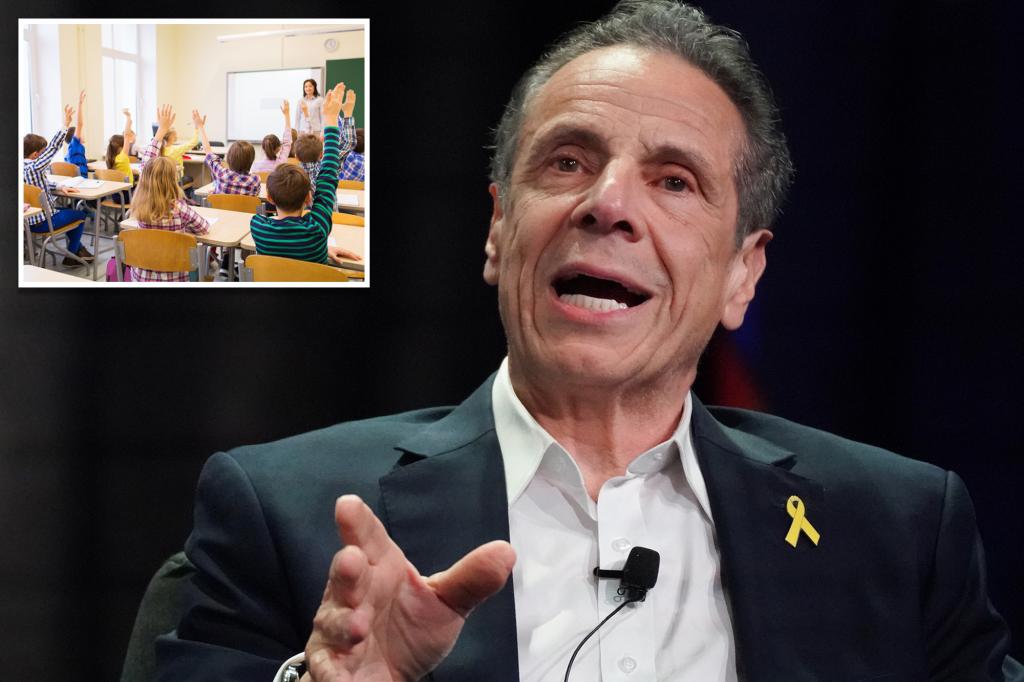Cuomo’s Education Strategy Sparks Debate Over Union Priorities and Charter Schools
Governor Andrew Cuomo’s newly unveiled education plan has ignited controversy by strongly aligning with teachers’ union demands while scaling back support for charter schools. The proposal, announced last week, prioritizes increased public school funding and union-backed policies, marking a significant departure from his previous charter-friendly stance. Education advocates warn this shift could reshape New York’s educational landscape, potentially affecting 2.6 million public school students and 275 charter schools statewide.
Union-Friendly Policies Take Center Stage
Cuomo’s plan includes several provisions long championed by the United Federation of Teachers (UFT) and New York State United Teachers (NYSUT):
- A $1.3 billion increase in Foundation Aid for public schools
- Stricter certification requirements for charter school teachers
- Moratorium on new charter school approvals in New York City
- Enhanced collective bargaining rights for unionized educators
“This plan finally recognizes the vital role of public school educators,” said NYSUT President Andy Pallotta in a statement. “After years of underfunding and charter expansion, we’re seeing a return to policies that put students and professional teachers first.”
Charter School Advocates Sound Alarm
The proposal has drawn sharp criticism from charter school networks, which currently serve over 140,000 students statewide—primarily in low-income communities of color. Data from the New York City Charter School Center shows charter students outperform district peers in math and English by 15-20%.
“This is political payback to unions at the expense of disadvantaged kids,” argued James Merriman, CEO of the New York City Charter School Center. “When 65% of charter students are Black or Latino compared to 40% in district schools, these policies disproportionately hurt communities that need quality options most.”
Political Calculus Behind the Shift
Analysts suggest Cuomo’s pivot reflects changing political winds. With teachers’ unions contributing $2.8 million to state Democrats in 2022 and charter advocates donating just $350,000, the calculus appears clear. Meanwhile, recent NY1/Siena College polls show 58% of Democratic voters now prioritize strengthening traditional public schools over expanding alternatives.
“This isn’t education policy—it’s survival politics,” said Columbia University political science professor Steven Cohen. “After nearly losing his primary to a progressive challenger last cycle, Cuomo needs union support. Charter schools simply don’t deliver the same electoral ROI.”
Potential Impacts on Students and Communities
The proposal’s practical effects could be far-reaching:
- Classroom Resources: Public schools would gain $700 per student on average
- Teacher Workforce: 8,000 charter educators might need additional certification
- Parent Choice: 50,000 students on charter waitlists could see options shrink
Bronx mother Luz Rivera, whose daughter attends a high-performing charter, worries about the changes. “They told us ‘school choice’ mattered. Now they’re taking choices away because some politician needs votes?” she said outside a recent community meeting.
National Implications of New York’s Debate
As the nation’s fourth-largest school system, New York’s policy shifts often ripple across states. The current battle mirrors broader Democratic Party tensions between progressive union allies and education reformers. Notably, the plan:
- Contradicts Biden administration support for “diverse school models”
- Aligns with AFT President Randi Weingarten’s anti-privatization push
- Could influence 2023 mayoral races in Chicago and Los Angeles
What Comes Next for New York Education?
The State Legislature must approve Cuomo’s plan by April 1 as part of budget negotiations. While Assembly Democrats likely support the union provisions, some Senate moderates may push back on charter restrictions. Meanwhile, advocacy groups on both sides are mobilizing:
- UFT planning “Support Our Schools” rallies in March
- Charter networks filing legal challenges to proposed caps
- Parent organizations collecting signatures for compromise proposals
As the debate intensifies, all eyes remain on whether Cuomo can balance political necessities with educational outcomes. “At some point,” notes education policy analyst Maya Wiley, “we need to move beyond union versus charter fights and focus on what actually works for kids—regardless of school type.”
For parents seeking to understand how these changes might affect their children’s schools, the State Education Department will host virtual town halls throughout February. Registration information is available on their website.
See more TED Talks World



